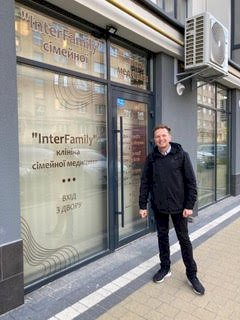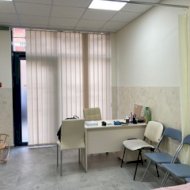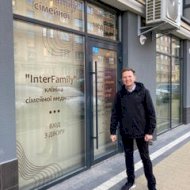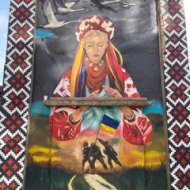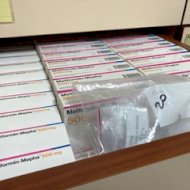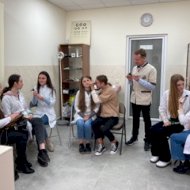I have recently visited Ukraine at the invitation of Pavlo Kolesnyk who is a GP and Associate Professor in Family Medicine in Uzghorod. I have known Pavlo for several years through EURACT the educational network of WONCA Europe[the association of family doctors]. Pavlo has been involved in several of WONCA Europe’s networks for many years and has an extensive network of contacts in Europe and the USA. This was my third visit to Ukraine, but my first during the war. I was motivated to visit as Pavlo and his colleagues have been working hard since the outbreak of the war to provide services to the population of Internally Displaced People [IDP] who have caused the population of Uzghorod to increase from 100,000 to 150,000. I along with many colleagues in Europe and the USA have been showing our solidarity with Ukraine by raising money to enable the work to continue.
On 17th October I traveled by bus from Košice in Slovakia to Uzghorod in Ukraine. Buses run several times a day on this route. My fellow passengers were mainly women, some with children and a couple of older men. The journey took about three hours and the border crossing was straightforward. The first signs of the war came on the Slovakian side of the border where there were a series of welcome tents for refugees.
I was very pleased to be met by Pavlo in Uzghorod. We went to his home where he had kindly agreed to accommodate me. It was very good to meet with Pavlo and his wife Nathalie. His brother was also visiting from Kiev.
Uzghorod is just 5 Km from the border with Slovakia in Trans-Carpathia. This proximity to the border with the EU and a NATO country has helped keep it safe and there has been no bombing in the area. There are however regular air raid warnings which most people in Uzghorod ignore. However it is disruptive for the children’s education as schools do not function during the air raids.
On my first morning the air raid siren went off at 8.30, and everyone’s mobile phones alarmed. We left for the clinic as planned and the streets were busy. The walk from Pavlo’s home to the clinic is along the river which was looking very beautiful in the sunshine with the vibrant autumn colors. Pavlo pointed out the buildings that were being used as bomb shelters, they were protected by sandbags. We saw a Red Cross center that had been set up to support the IDPs. We passed student accommodation and Pavlo explained that the students were now mostly learning online from home as the refugees were living in their accommodation. Medical students attend face to face classes only in the first and last year at the moment.
The clinic is situated on the ground floor of an apartment block. It has been fully renovated and there is an attractive reception, four consultation rooms, a treatment room and a laboratory. It is well equipped with an ECG, audiometer and the necessary laptops. I met several members of the team including young doctors, residents and a medical student. Pavlo was due to teach a group of medical students and he was not sure whether they would arrive due to the air raid alarm which was still current. However, they arrived as expected – clearly keen to get on with their education despite the alarm. Pavlo proceeded to deliver an excellent interactive session on the topic ENT in Family Medicine. He did this using a series of cases with photographs of relevant pathology. He also included a session on the use of the auroscope which was valued by the students. They were fully engaged throughout the session and at the end reflected on what they had learnt: the practice session was valued and Pavlo had introduced them to the concept of antibiotic stewardship and how a delayed prescription can often help to reduce usage. He commented at the end on how his teaching had been heavily influenced by what he had learnt through EURACT.
During the morning I was also able to sit in on several consultations, which were conducted by a qualified family doctor supported by a medical student and or a resident. The emphasis in the clinic is on delivering evidence based person centered care and avoiding unnecessary procedures and investigations. The patients were generally older, all coming from eastern Ukraine and having various chronic conditions in addition to the problems that stem from being displaced. Also attending that morning was a man who had just arrived from the Kherson region, he had had to escape rapidly and had no papers. A man with a past history of stroke several years earlier presented requesting a referral to hospital for ‘an injection’ was skillfully taken through the most appropriate way of ensuring he had the best care and left satisfied without a referral. Another man from the east came with his elderly mother, he was very distressed and angrily demanding medication. All these patients were dealt with peacefully and professionally and their needs dealt with appropriately. The clinic is able to supply medication free of charge due to the generosity of the donors, which is of real help to these people who often have very limited financial resources.
In the afternoon I delivered a session in the Department of Family Medicine on ‘The Art of Giving and Receiving Feedback’. Medical students, residents and experienced doctors took part in this and fully engaged with the small group work.
In many ways this was just a normal day in the life of a GP teacher, but in the background there are always thoughts and reminders of the war. Pavlo talked about how hard it was to listen to the news, he found himself becoming overwhelmed by it so now he rations his exposure. Someone who lived in Kyiz described how horrifying it was to live through the bombing of Kyiv both at the start of the war and recently with the drone attacks. He described how unbelievable it is that one will notice a building one day and the next day it is destroyed.
People like Pavlo have worked so hard to develop services such as Family Medicine and it is heartbreaking to see the good work being destroyed particularly in the Eastern part of Ukraine. There is worry about the children and young people’s education – having been disrupted for two years through COVID they are now experiencing further disruption due to the cessation of classes during the frequent air raids. On the day of my departure we had to leave very early as the border is closed during air raid alarms. There is still a sense of disbelief that this can be happening to their country and an understandable inability to make any sense of all this destruction. There is however relief that President Zelenskyy has proved to be such a good leader in these times and people take comfort from the support being received from across the world.
Background
I was able to spend time with Pavlo and learn about how he and his colleagues have developed their services since February. After February 24th there was a rapid movement of people from Eastern Ukraine, many of whom stayed in Uzhgorod. Many different buildings were used as emergency shelters and there was an acute need for immediate aid to sustain the necessities of life.
When the war started many colleagues from abroad started to ask how they could help. Pavlo contacted a friend in Budapest who set up a bank account for the transfer of funds which could then be sent to Ukraine. The first donations arrived within 5 days of the war breaking out. Teaching at the university had stopped for 2 weeks after the 24th February and Pavlo found himself in the strange position of not being busy yet surrounded by a population with huge needs. He and his family were volunteering at the municipal center for processing humanitarian aid. Pavlo recognised that the IDPs had medical needs that were not being met. Medication supplies were in danger of running short, some drugs such as thyroxine [particularly needed as after the Chernobyl disaster there has been an increased incidence of underactive thyroid glands for which this drug is essential] were difficult to source. Pavlo’s contacts in Hungary helped with this and medications were donated or purchased with the first financial donations. Some of the donations of medications were for drugs needed in an emergency that were not required in large quantities so any excess was sent to the cities close to the frontline. In addition some of the funds were spent on supplies to meet basic needs such as washing machines and kitchen equipment.
Clinics were started in the accommodation at the border, at the train station and where the IDPs were living. These were staffed by volunteers – often students or young doctors and were aiming to provide ‘first aid’. It was soon clear that these doctors also had needs following their consultations. Pavlo, who is always looking for educational opportunities, set up nightly online meetings called “Lullaby Sessions’ which provided a space for the doctors to debrief and then hopefully to enable them to sleep without worrying about the patients they had seen that day.
Medications were dispensed from the first aid stations and it became clear that the IDPs were accumulating medications. Whilst this was completely understandable, given the instability in the country, it was not a good use of resources and it was clear that a tracking system was needed.. A free family medicine clinic was established at the children’s hospital which was staffed by family doctors. The patients seen were then registered and a record kept of medications dispensed
By the beginning of May two months into the war, it was recognised that many of the IDPs were not going to return to eastern Ukraine in the foreseeable future. It was not felt appropriate or necessary to continue to provide basic humanitarian aid. Pavlo consulted with various people including Professor Nele Michels from EURACT, Dr Mark Rampton a long standing friend of Uzghorod from the twin city in USA and Professor Shlomo Vinker of WONCA Europe. The outcome of these discussions was the idea that a permanent clinic for the refugees would enable the money donated to be used most effectively. The advice of these experts was that it would be better to purchase the accommodation. Pavlo was fortunate to locate a suitable space in the ground floor of a modern apartment block close to some of the accommodation being used by the IDPs. The owner agreed to sell for a reasonable price and a donor from the USA agreed to contribute some of his own money to ensure that a big enough space could be purchased.
As soon as the purchase was completed the refurbishment started and proceeded rapidly. The International Clinic of Family Medicine or ‘Interfamily Clinic’ was opened on 23rd September, the opening ceremony was attended by the Dean of the Medical School and Dr Rampton and colleagues from Corvallis in the USA amongst others. The clinic now has 30 staff who are offering their services on a sessional basis.
From the start Pavlo’s vision was that this clinic should be a teaching clinic and from my observations this is becoming a reality. Not only is there education provided at all levels of the medical career but a project to provide online educational information to patients has been established. Opportunities for teaching in family medicine are not easy to come by in Uzghorod and so this clinic offers a new model.
Doctors Without Borders
Negotiations were started four months ago with Doctors Without Borders[DWB] for some help in the clinic. There have been several visits from experts from the organization and a proposal has been established for them to provide the funding for one family doctor and one psychologist. This will complement but not replace the work being done in the clinic. These negotiations have taken a considerable amount of time, one of the challenges is how to match the needs of DWB for coding and medication management with those already established by the clinic. The agreement is now with the lawyers and it is hoped that the work will start soon. This episode illustrates the benefit of giving funds in an emergency situation directly to local people who are able immediately to start using it. Clearly NGOs have an important role but they perhaps are not quite as agile as Pavlo and his colleagues have been.
The Future
Consideration has been given to sustainability. Now that the clinic has been completed an application has been made to the city authorities for a license. It is expected that this process will be completed in a month’s time. Six months after the license is issued the clinic can start to claim capitation fees from the government. Pavlo estimates therefore that within 9-12 months the clinic will be self-sustaining. In the meantime additional funds are needed and this is one of the ways in which we can show our solidarity with Ukraine.
Jo Buchanan
EURACT Immediate Past President
19th October 2022

